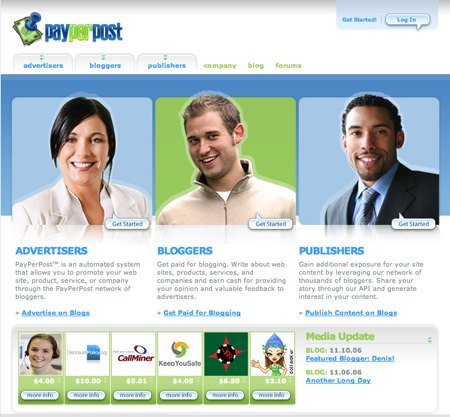I’ve been wanting to write about this for months, but now it’s really time. Its about a new marketing phenomenon that really threatens to corrupt the blogosphere: advertisers paying bloggers to write about services and products to generate buzz.
This, of course, is part of the larger trend of word-of-mouth marketing that is all the rage these days.
Word of mouth is the strongest form of publicity a company could hope for. How many times have you recommended a service to a friend or showed off your phones features to colleagues. Companies, aware of the power of personal recommendations, are coming up with all sorts of ploys to induce a word of mouth phenomenon around their offerings.
There is nothing wrong with a company doing something creative, effective or very useful that is then carried over by people by word of mouth.
But what is wrong is to totally fake personal recommendations by paying people to tell their friend (or circle of influence) something positive about a product or service.
Now the US Federal Trade Commission is taking note [hat tip to The Last Podcast]
FTC Moves to Unmask Word-of-Mouth Marketing – washingtonpost.com:
The Federal Trade Commission yesterday said that companies engaging in word-of-mouth marketing, in which people are compensated to promote products to their peers, must disclose those relationships.In a staff opinion issued yesterday, the consumer protection agency weighed in for the first time on the practice. Though no accurate figures exist on how much money advertisers spend on such marketing, it is quickly becoming a preferred method for reaching consumers who are skeptical of other forms of advertising.
You can see the PDF of the Commission’s report here.
So who is doing this on the blogosphere?
Take PayPerPost and ReviewMe for example:


Bloggers can sign up with PayPerPost or ReviewMe and choose from a number of ‘opportunities’ they can write about. If the blogger satisfies certain conditions in his/her post, PayPerPost pay that blogger money.
When I heard about this from some Jordanian bloggers I was really appalled.
I mean COME ON guys. Even the bad old media marks any ad that looks like editorial content as ‘Advertising’ or ‘Advertorial’. And blogging is supposed to be the ‘People’s Media’. What on earth is going on?!
Now, I am involved in a venture that enables advertiser to advertise on blogs (this one included). But it is clear what is advertising and what is a ‘real’ blog post in this case.
And when a blogger writes about his or her own work (which I also sometime do ![]() the self promotional aspect is very clear.
the self promotional aspect is very clear.
Or, I might write something like ‘i just bought an iPod Nano and I really like it’. But I would never accept direct payment from Apple to write a blog post about their products.
Of course, critics of advertising in general or advertising on blogs in specific, would say that advertising ALWAYS corrupts the editorial integrity. And these critics do have a point. If I am advertising something on my blog, let’s say through a banner ad, would I dare to criticize the advertiser if I found fault in their offering? My ethics tell me that yes, it is my duty to write my true opinion.
Surprise, surprise, it even happens in traditional media like, like magazines or TV. Take the BBC’s TopGear magazine and TV show for example. They sometimes drag new car models through the mud, yet they accept advertising. On the other hand, clever advertisers should accept criticism from publications and not boycott them if they give them a bad review.
Some people might just write a blog out of passion and as a channel of self expression. Others live from their writing. Advertising is still the most common formula for publications to make a living. Book writers live from the copies they sell, lucky them. In a perfect world, bloggers who want to make money would be paid a few cents by every reader, but there is still no globally accepted mechanism to do that.
So advertising, for me, is an acceptable means of earning money. But writing posts that are actually ads is not.
PayPerPost, seem to have anticipated an outcry. They have recently published a Disclosure Policy that require bloggers to mark paid post as such. They also say that they do not accept advertiser who specifically request positive reviews of their offerings.:
PayPerPost: Our Disclosure Policy:
Our Disclosure Policy: This policy is valid from 28 October 2006. This blog is a sponsored blog created or supported by a company, organization or group of organizations. For questions about this blog, please contact info at payperpost dot com.Can I require a positive review?
We do not allow advertisers to require a positive review. The vast majority of reviews are measuredly positive, although many do contain constructive criticism. We view this as a bonus: how else can you quickly and cheaply get feedback on a product or service from influencers?What are the review guidelines?
We like to keep the guidelines loose, so bloggers can write in a way that makes sense for their unique niche and audience. We do require that all reviews are at least 200 words long, and that the review post is disclosed as being sponsored in some fashion.
Some popular blogs, like Engadget, are starting to display advertorial style text below their posts. But at least those are clearly marked ‘Advertisement’.

This remains within the bounds of acceptable separation between advertising and editorial content.
As the ‘social web’ becomes more and more mainstream, the attempts to coerce it and corrupt with become increasingly aggressive. The latest examples include the attempts to influence Digg, the well known social news site, by hiring ‘digg monkeys’ (paid users) who go a digg a specific story to make it appear prominently on the site.
I can only hope that such sites find ways to avoid getting totally corrupted by such practices.
Read these related posts on 360east:
- Invitation: Adel Iskandar talk on “blogging arabia” this Thursday
- Bloggers and mainstream media at the German-Arab media dialouge
- Ending my self-imposed blogging hiatus
- Toot and Arab blogging to be featured today on Amman Net Radio
- A new blog is created every second.. What about Arabia’s blogosphere?
Comments
One response to “When blogging becomes LESS credible than the ‘old media’!”
you know what I do not like about it, well.. a blog to me is a personal website, if you have to disallow people from writing comments in some form (e7em e7em.. ) then people will start leaving your blog and it’ll be out of interest for them as well.. and instead of being a personal website it’ll be another stupid spam site to check.